No sugar and 2am workouts: Lenny Kravitz gives 60 the rock star treatment
How the music legend looks – and feels – this good as he tours the globe.
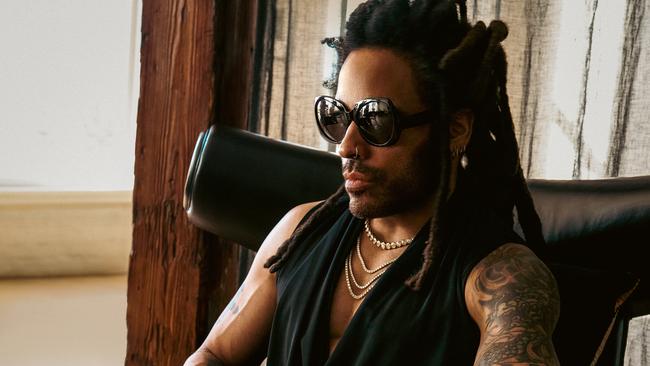
Lenny Kravitz’s Parisian home is spectacular. A four-storey townhouse in the 16th arrondissement, originally built in the 1920s as the US embassy to France; since 2006 – when Kravitz bought it – an outrageously glamorous, high-ceilinged, light-flooded, art and object-filled European base for/aesthetic testimony to one of the world’s foremost rock stars.
Kravitz himself is also spectacular: 175 centimetres (5’9”) of elegantly ripped beauty, jet-black dreadlocks, a nose ring. Perpetually exquisitely well dressed (black pants and a black turtleneck today, both of which fit so well, they can’t not be designer). Is anything about him bad taste, I’ll ask. “I have good taste – according to me,” he’ll reply. A voice so bassy, low and loud you’re left in no doubt how he’s worked a crowd during the course of the 35 years since his 1989 album, Let Love Rule projected him to a stardom on which he’d never planned (“I’d thought I was going to be this jazz musician, playing in a club”) but entirely enjoyed (“Oh, it was a trip”).
He is 60. Naomi Campbell, Salma Hayek, Chris Rock, Laurence Fishburne, Kravitz’s ex-wife Lisa Bonet and their daughter Zoë Kravitz all came to his party in May last year. “So did my fourth-grade teacher. I love this woman. Her name is Joan Goldberg. She flew all the way from New York to Paris,” Kravitz says.
Everyone says you’re getting better with age, I tell him.
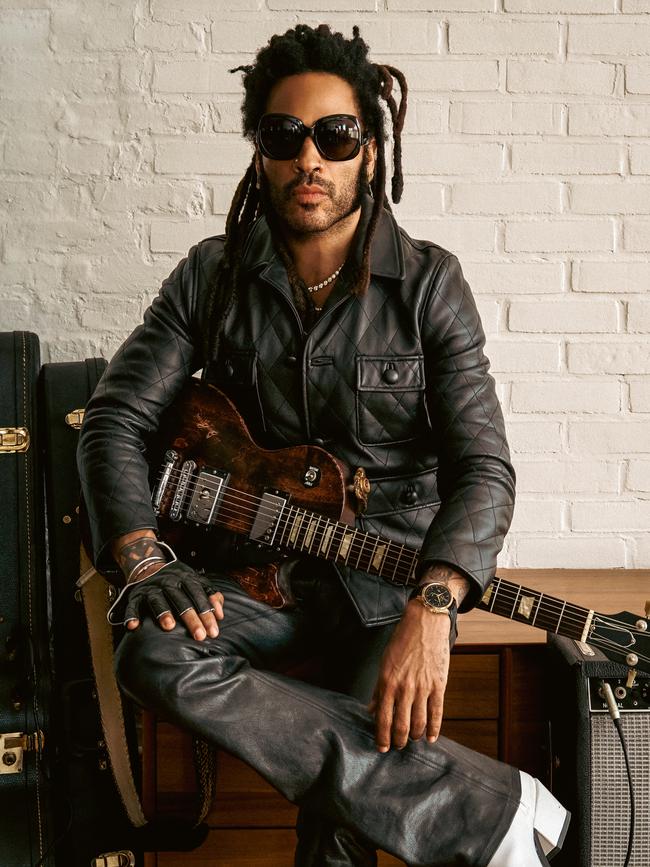
“I have to say it’s true. That’s not ego, that’s … I’ve never felt physically better in my life. But that’s by virtue of a tremendous amount of work.”
Kravitz’s diet is raw, vegan, sugar-free; he trains every day. “The other night I was in the gym at 2.30 in the morning. I was working all day. My trainer [Dodd Romero], he’s like, ‘Man, you are crazy. People don’t understand. They see the result, but they don’t understand that you’re in the gym at 2.30 in the morning doing this workout’. I work with my trainer via FaceTime because he’s out doing other things. He’s with Denzel [Washington] right now, preparing for a play. I put them together, years ago. Wait until you see how wonderful Denzel is looking, how healthy he is. So yes, when I look at pictures from now and pictures when I was even in my twenties, there’s no comparison, which is very odd.”
It’s important work, I say, because how else are you supposed to send the internet wild with video footage of you weight training in leather trousers and a see-through tank top? (In April last year, Kravitz did precisely this.)
“Ha! That was hysterical.”
It really cheered everyone up.
“That kind of event happens because [Romero’s] very busy. I’m very busy. Sometimes the phone will ring, ‘Hey, brother, are you available now?’. And whatever I’m in is what I will come in. Now, I wouldn’t do cardio dressed like that. You’re gonna sweat profusely, correct?”
Correct.
“But lifting weights? You might sweat a little. The next day, the guy who ran the gym said, ‘The outfits started to change. People started coming in wearing, you know, whatever’. Like, ‘Oh, we can do that?’.”
Kravitz beams. He seems delighted with that legacy.
“I feel like I’m where I’m supposed to be.”
Lenny Kravitz has invited me to his art piece of a home (locked street gate leading to a garden filled with palm trees; shoes off at the front door; black toilet paper roll in the very – riskily – dimly lit bathroom; housekeeper offering you pretty much anything you like, anything at all) to talk about the European leg of his forthcoming tour. The Blue Electric Light tour is named for his 2024 studio album, his 12th to date.
“I mean, I’m very fortunate. I was just in South America recently and the feeling of love in the room. Not only to me, but from me to them, and to each other? It was joyous,” Kravitz says.
Is it the best feeling in the world?
“It’s pretty good. I feel like I’m where I’m supposed to be, doing what I’m supposed to do. The studio is my favourite place because it’s where it’s happening. It’s where it’s being created. But live is where you share it, and the music is their music as well.”
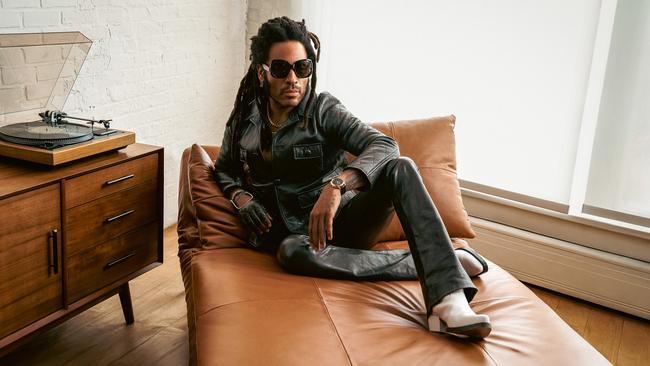
Does Kravitz worry about ticket sales? Does he ever wonder, is this the tour when people stop coming?
“No. Oh, I ask questions. ‘How are we doing? Are we sold?’. ‘Yeah, we’re sold. Yeah’.”
But anyway, he says, long careers have “all kinds of dynamics … I don’t care who you are, what legend you are. The people that I look at, the icons that taught me [his friend Mick Jagger among them], they’ve gone through all the same things … ‘Well, during this period we weren’t as hot’.”
How does Kravitz manage his Less Hot periods?
“They weren’t ‘less hot’ for me, just maybe, you know, the trends. It was a time where it was very this or very that, and what you’re doing is so the opposite of that. But you just keep going. It’s not about just that moment. It’s about the whole journey.” >
I know a thing or two about Kravitz’s journey. This is the second time I’ve interviewed him.
The first was in 2020 at the height of covid. We’d convened online; he’d Zoomed from his Airstream trailer in Eleuthera in The Bahamas (this being the second of his homes; the third is a farm outside Rio de Janeiro). He’d popped over to Eleuthera in early 2020, got stuck for months and months in a space he now tells me “is the size of that couch, the length of this whole room”. But that was fine; he adores the Airstream.
Kravitz likes spacious, high-end luxe or basic, authentic, diminutive simplicity, he says. “Give me the palace or give me the ghetto. The middle doesn’t do it for me. I can stay somewhere in the hood that you would not even imagine that I could stay. I often go to dangerous places and hang out.”
You actively seek out dangerous places? “I just end up there.”

That first interview had been in honour of his (extremely good) autobiography, Let Love Rule, a book that starts with his childhood and ends before he gets famous. That childhood was split between the fanciest reaches of the Upper East Side – where his mother, the actor Roxie Roker, and his father, television producer Sy Kravitz, lived – and the (back then) far from gentrified reaches of ’60s Brooklyn, home of his maternal grandparents. It was easy to see how such a particular early experience of life forged such an unusual man. Kravitz was biracial (Roker was black, Sy Kravitz Jewish) and his experience of New York was both upscale and celebrity studded – his parents were friends with Duke Ellington, Miles Davis, Ella Fitzgerald; actor Cicely Tyson was his godmother – and purest, unstarriest working-class Brooklyn. By age three, he was playing drums on pots and pans; by five, he knew he wanted to be a musician.
When Kravitz was 10, Roxie Roker was cast as a lead role in the long-running CBS television sitcom The Jeffersons, a gig that would make her very famous. Kravitz, Sy and Roxie relocated west to Los Angeles; Kravitz went to school at the preposterously starry Beverly Hills High School (alumni: Nora Ephron, Angelina Jolie, David Schwimmer, also Slash and Nicolas Cage, both of whom were there at the same time as Kravitz) where his ambitions for a creative existence would only catch fire.
Kravitz adored his mother but had a difficult relationship with his authoritarian father. He left home at 15 and somehow found his own way into a music industry that was initially resistant to his work, considering it neither black enough nor white enough to make sense to any audience. But Kravitz persisted.
In 1987 he met The Cosby Show actor Lisa Bonet, and the two began a relationship credited by Kravitz with helping him find himself creatively. They married in Las Vegas in 1987; Bonet gave birth to their daughter Zoë a year later. A year after that, in 1989, Kravitz released Let Love Rule and became a star. As well as his own music, Kravitz co-wrote and produced Justify My Love for Madonna in 1990. He also co-wrote and produced Vanessa Paradis’ 1991 self-titled album.
Don’t miss your copy of the April issue of WISH magazine in The Australian available today, Friday, April 4
Bonet and Kravitz split in 1991 and divorced in 1993 (the 1991 hit It Ain’t Over ’Til It’s Over is widely presumed to be about the end of that relationship). Kravitz’s career went on to become as broad, ambitious and unexpected as they get – from popping up as Cinna the stylist in the film adaptations of post-apocalyptic YA bestseller The Hunger Games to performing alongside Katy Perry at the Super Bowl halftime show; from launching an interior design agency to being made an officer of the Ordres des Arts et des Lettres in 2011 by France’s then minister of culture and communication, Frédéric Mitterrand, and a global ambassador for watch brand Jaeger-LeCoultre.
His romantic history is equally impressive and ambitious; following unsubstantiated rumours of affairs with Madonna and Kylie Minogue, he had a five-year relationship with Vanessa Paradis in the ’90s, an engagement to Nicole Kidman in the early noughties, then another to the model Adriana Lima.
He’s now single. Has been for some 10 years.
“Yeah.”
Is he better on his own?
“I’m good on my own. There’s nothing like a relationship with … you know. But right now, I’m good where I am.”
Kravitz has spoken about choosing to remain celibate until he finds someone to whom he can fully commit. “It’s a spiritual thing,” he said in 2024. But when I raise the issue of his celibacy, he waves one hand at me vigorously, shakes his head, and says, “We’re…” but offers nothing more. This could mean, “We’re not talking about that,” or, “We’re not doing that anymore,” or … ah, who knows?
Kravitz’s relationship with his 36-year-old daughter, actor and model Zoë Kravitz, is clearly a close one.
“I love being her father,” he tells me. I’d very much got this sense from the other time Kravitz went viral – last March, when he received a star on the Hollywood
Walk of Fame. Denzel Washington attended, as did Zoë and her then fiancé, fellow actor Channing Tatum.
In the viral video, Zoë gives a speech for her father, heartfelt and adoring and … well. You’ll see.
“I’ve seen the way you show up and take care of the people you love,” she says. “I’ve seen your incredible dedication to your art. But mostly? I’ve seen through your shirts. According to my dad, if it doesn’t expose your nipples, it’s not a shirt. And sure, it used to embarrass me when you picked me up from school as a kid but I gotta say, at this point? I respect it. You really do pull it off. Your relationship with the netted shirt is probably your longest one – and it works. You two make each other better. If it ain’t broke, don’t fix it. It’s a beautiful thing.”
Kravitz can be seen in the background, laughing uproariously. “Oh, wasn’t that fabulous?” he says.
So good. You had no idea she’d say that, did you?
“No. You see, that’s what your daughter’s supposed to do. That is absolutely exactly what your daughter is supposed to do. And she told the truth. She’s dry. But she told the truth.”
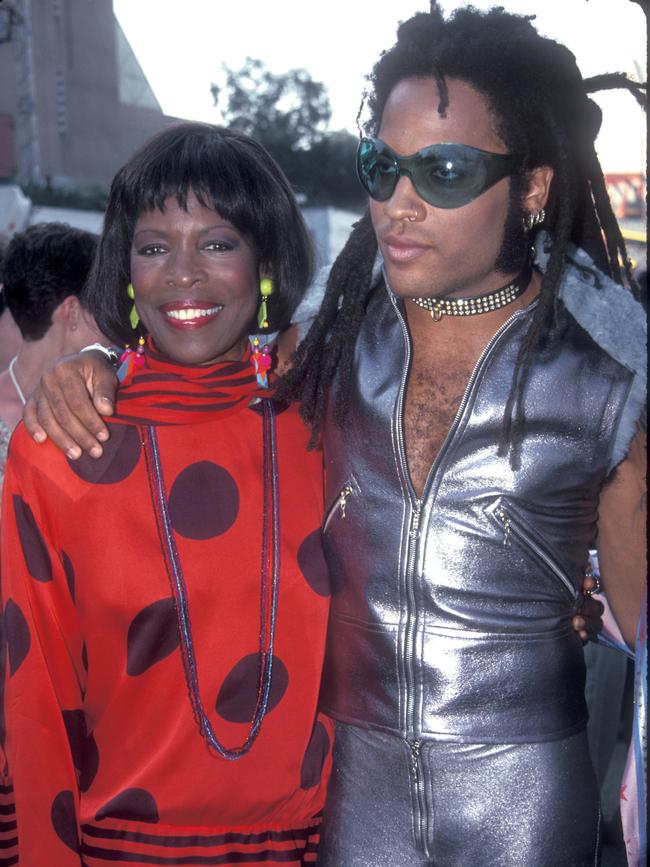
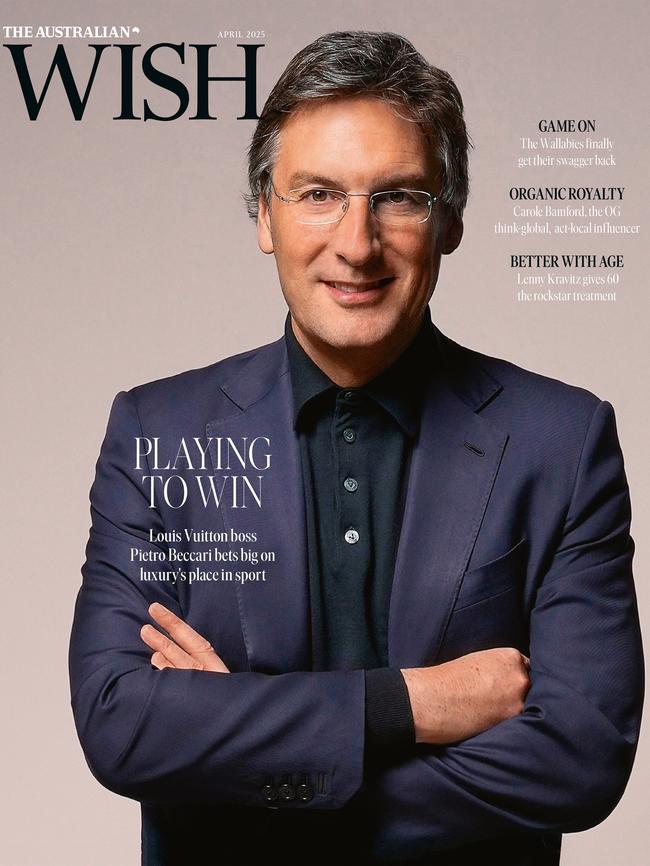
Was there a moment when you fell in love with netted shirts as a concept or …
“I don’t think about it like that. Let’s say … You thought about what you’re wearing today?” I did. “But you didn’t think about it?” (Weeeeellll…) “You just grab it and go, right? I didn’t realise how many shirts are mesh. They’re just shirts to me, you know what I mean?”
That’s her point.
“Exactly. So now people come up to me when I’m wearing [one], ‘What did your daughter tell you?’. I’m like, ‘What?’. And I look down and I’m, like, ‘Oh my god. I’m a caricature of myself’.”
He points at his torso. “But, as you see, now I’m wearing a turtleneck – and there are no holes in it.”
Was that on purpose, because you thought I’d make a big deal about it?
“No. Actually, I was wearing this yesterday and it was on the floor by the bed, so I put it back on.”
I see.
“We’re not in mesh shirt weather,” he says, which is true; Paris is 2°C at most.
How not to be a father
Kravitz tells me his experience of his own father entirely informed his raising of, and relationship with Zoë. “It taught me what not to be.”
Sy Kravitz was a difficult man. “We never spoke a lot. It wasn’t a warm and fuzzy relationship.”
When Kravitz was a young man, he overheard his father talking to his mistress on the phone, which devastated the musician. When his parents eventually broke up, because of Sy’s infidelity, his father essentially cursed his son to repeat his mistakes. This was something with which Kravitz then struggled for decades. “When you’re having that discussion – they’re splitting up, he’d been caught and blah blah blah … When your mother then says to your father, ‘What do you have to say to your son?’, you really assume it’s gonna be, ‘Well, son, I hope you learn from my mistakes. This is wrong – it’s based on my insecurities and what I went through with my father and I hope that we can talk about it’. Not look you in your face – this far from your face [he puts both palms directly in front of his eyes] – and say, ‘You’ll do it, too’ and walk out the door. What is that?”
Worse yet, Kravitz would feel that Sy’s predictions weren’t, perhaps, completely off the mark. “I didn’t become that person right away. It was after the marriage and all of a sudden I was just out there and I realised that I changed. It was something I had to work out.”
Kravitz and his father were reconciled before Sy’s death in 2005. Sy came to live with his son and Zoë for his final months. “I don’t put people in places.”
You care for them, at the end?
“At home. Always. By the way, to his credit, he was an amazing grandfather. I watched that and enjoyed that. And even though I could say, ‘Well, I never got that kind of treatment’, it doesn’t matter. It does not matter. She did, and her memories of him are wonderful.”
Does Kravitz hope to be a grandfather himself? Zoë doesn’t have children yet (she has, in the past, said she isn’t sure she wants them at all). Kravitz pauses for long enough that I wonder if I’ve overstepped. Zoë is famous in her own right. Might I be transgressing, sneaking in questions about the personal life of the celebrity I’m not presently interviewing?
But that’s not the issue.
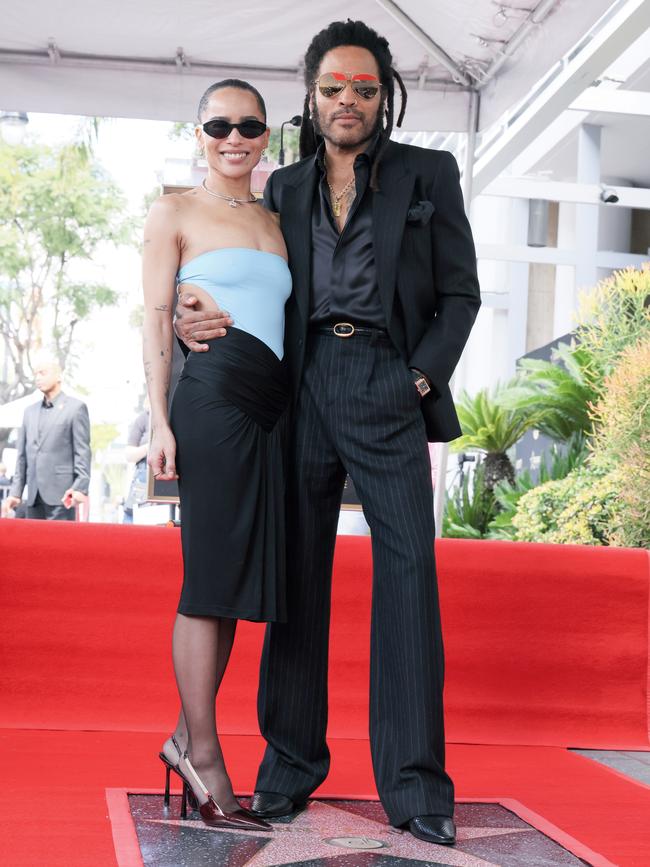
“Ah, of course. If it happens. Yeah, if it happens. It feels weird, just hearing the word.” Grandfather? “Probably, because I still feel like a kid. I honestly still feel like a kid.”
I ask him if he’s had his biological age tested.
“I haven’t. I will do.”
No way it’s a day over 32, I say.
I ask about how he writes music and he says he dreams it – wakes up with songs in his head, sings them into his phone or plays them on the guitar.
Do you sleep with your guitar?
“Ha. It’s in the room.”
How many pull-ups can he do? “I can easily do 50. I couldn’t do two of them when I was a teenager.”
And how does he shop for fashion?
“I know where to get my stuff. I have certain vintage dealers that I deal with. They curate things, they know what I like … I have people that make things also – custom. I wear a lot of Saint Laurent.”
How about furniture shopping?
“Furniture? All over. Different vendors. I go to the Paris flea market. When I’m home, I’ll go every week.
I love to walk through the flea market. The people that have their shops, they all know me. I’ve been going for years and years, since the ’90s, when I was with Vanessa. She turned me on to that.”
“I love a bit of camp every now and again”
Later, he’ll take me into his “Roxie Room”, a beautiful square corner room, the walls of which are covered in pictures of his mother, who died in 1995.
He’ll tell me about the process of getting them perfectly framed, how someone put him in touch with one of the framers for the Louvre, and how wonderful it had been choosing beautiful antique frames for his beautiful mother. “And then the bill came. And it was obscene. Obscene!” he’ll say, throwing his arms in the air, laughing.
Finally, because we’re in Paris, because he is an American in Paris and has been for some decades, I ask him if he’s aware of Emily in Paris, the extremely popular Netflix show about a young American PR woman living in, well, Paris.
“I’ve seen the whole thing,” Kravitz says.
“I love a bit of camp every now and again. I know the creator [Darren Star], who I met after I’d watched it. We were at a dinner in LA at a friend’s house. She said, ‘He does Emily in Paris.’ I was like ‘You do?’.”
No way, I say. Lenny Kravitz looks at me, amused.
“Why are you surprised?” he says. “Why did you even ask the question?”
Honestly? I didn’t think you’d even know what I was talking about. I thought you’d be too cool.
“Oh, sometimes you’ve got to watch some telly, man. Sometimes you’ve got to watch a bit of telly.”
This story is from the March issue of WISH.




To join the conversation, please log in. Don't have an account? Register
Join the conversation, you are commenting as Logout